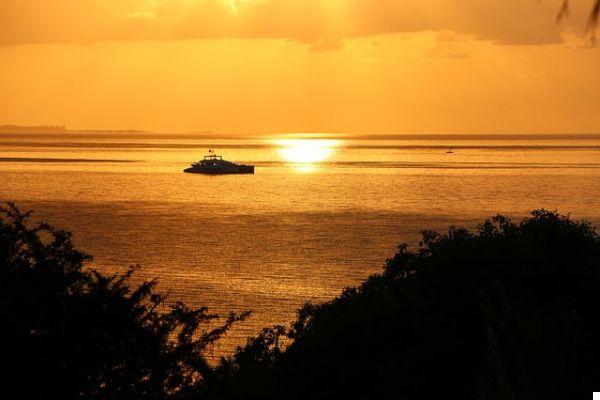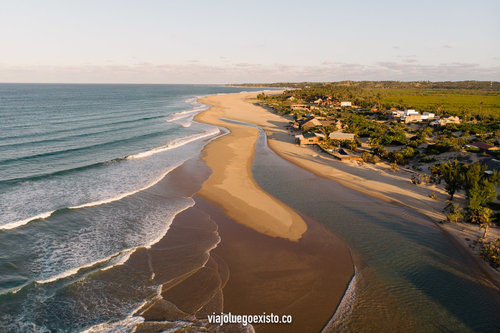Il Mozambique it is a wild land, where nature is still preserved from mass tourism. Crossroads of cultures, this former Portuguese colony in Southeast Africa is home to exceptional places: sandy beaches, islands with a unique character and mysterious atmosphere, mangrove forests and landscapes of dunes and lagoons.
Original and fascinating destination, the Mozambique seduces lovers of seaside tourism and diving, but also i adventure seekers and new destinations.
There are two faces of Mozambique to discover: he south, Where Maputo, a modern and sparkling capital, concentrates most of the country's wealth, and whose infrastructure is in full swing; And he north, still largely underdeveloped, less visited, but much wilder, which remains a land of adventure.
Mozambique promises a varied landscape and the possibility of meeting a smiling and friendly people, not used to mass tourism.
For travelers who want to take the time to discover neighboring countries like it Swaziland or South Africa nothing is easier, two hours away you are in the heart of the warm Savannah of Swaziland with its economic safaris and tribal culture or at Kruger Park to observe lions and elephants.
To see
- Maputo – The capital of the country is a very lively city. Its Baixa district is very interesting with buildings with colonial architecture dating back to the Portuguese era, and newer but less typical buildings. There Cathedral of Our Lady of the Concession and National Museum of Arts are among the places to visit, as well as the Tunduru botanical garden, the market, the port and the Eiffel House
- The island of Mozambique - is a UNESCO World Heritage Site. The city of the island is fascinating with its fortifications (including the fort of San Sebastián) and the pastel facades of his houses
- The nature reserves of Niassa, Maputo and the Gorongosa National Park
- Beaches paradises of Tofu, Barra and Zalala
- The Bazaruto archipelago, where it is possible to discover the "Crocodile Lake" on the island of Benguera
- The cities in Beira, Vilankulo, Quelimane, Pemba, Nampula and Inhambane
- Lake Malawi
- Dive sites such as Barra, Bazaruto and Pemba
- The Channel Mountains
When to go
Il climate of Mozambique is subtropical. In Mozambique, the dry season, which runs from May to mid-October, is characterized by warm weather and cool nights.
From November to March, the climate is much more difficult to bear, with heavy rains and very high temperatures, especially in the Zambezi valley in the Mozambique West.
The climate varies by area. The hinterland is cooler than the coast, and the rains increase with increasing altitude. The ideal time to visit Mozambique it is the dry season, which runs from May to October. Temperatures are lower, but the sea remains warm all year round.
Attention, from December to March there are risks of cyclones and tropical storms on the coast.
Clothing
Light clothes during the day and warmer clothes for the evenings. Waterproof recommended all year round. Do not wear clothes that are too short in places of worship, keep your shoulders covered.
Documents
The passport with residual validity of at least six months with at least two blank pages and the Visa, to be requested, before departure, at the Embassy of the Republic of Mozambique in Rome.
If you intend to visit neighboring countries and later return to Mozambique, it is necessary to have a multiple entry visa to be requested from the Mozambique Embassy in Rome which allows a stay of up to 30 days.
How to reach us
By plane
The international airport of Maputo it is located 15 minutes north of the city (3 km). 25 minutes from the city center (13 km) is the airport of Beira. The airport of Napula is located 4 km from the city center. Buses are rarely used. Better take a taxi. It will cost you around 200.000 meticais. A $ 20 processing fee is required upon departure on international flights.
By train
A train goes of Johannesburg and Pretoria on the border with Mozambique, precisely a Ressano Garcia which is connected with Maputo. There is also a service of connection between Maputo and Bulawayo, in Zimbabwe, with a train change at Chicualacuala. Rail services are sometimes sporadic and unreliable.
On a boat
Cargo ships call at Maputo e Beira, but there are no regular services for travelers.
Cruise ships
MSC Cruises operates cruises from Durban, South Africa to Maputo.
Where to stay
. of international level are found mainly in the cities of Maputo and Beira. Accommodation in smaller towns is generally of a lower standard.
Bed and breakfast - It is possible to rent holiday homes, bungalows and rondavels (traditional circular houses) inexpensively.
campground - There are campsites along the beaches, and a campsite with a restaurant in Gorongosa Game Park. Camping is also allowed for various Catholic and Protestant missions in the country.
Other accommodation - Mozambique has only two recognized hostels, which are in Maputo and Praia do Tofo, Inhambane.
Health
Choose good medical and travel insurance. Prefer private clinics to hospitals. Drink water in sealed bottles. Peel the fruit and eat cooked vegetables. Avoid dairy products that may have been made with unboiled milk.
Compulsory vaccinations
None, but vaccines against yellow fever, hepatitis A and B, diphtheria and polio are recommended.
Safety
An increase in crime is observed around the capital Maputo and its industrial suburb, Matola, where attacks can occur during the night, rarely during the day. Do not deviate from the safe main axes and follow the safety instructions to the letter. Flights are many in the city. Avoid going out on foot at night, do not take hitchhikers in the car. For more information on safety, visit the Viaggiare Sicuri website.
Electricity
220 V. No adapters needed.
Telephone
To call Mozambique, dial 00258 followed by the code of the desired region (Maputo: 1, Beira: 3, Quelimane: 4, Nampula: 6) and the corresponding number.
Currency
Metical (meticais): 1 Euro is worth about 80 Mtm. The exchange rate is subject to fluctuations. Credit cards are increasingly being accepted in Maputo, but generally not outside the capital. Travelers checks are not commonly accepted and often have high commission rates.
Language
Portuguese is the official language while English is only spoken in tourist places. There are also a dozen local languages.
Transportation
You drive on the left and it is international driving license required. Prepare the route carefully as the roads are numerous.
In the city you can find the car rental offices such as Avis, Europcar, Hertz. The service stations are, in some places, even 500 km away from each other.
Taxis they are numerous. Cheap in Maputo, they are particularly convenient for night driving, or when the chapas route is not suitable for you.
trains - Few, not fast, unreliable and uncomfortable! In short, it is not recommended to travel by train in Mozambique. Overall, rail traffic is kept to a minimum and is mainly used for freight transport.
Gli bus they are overcrowded and slow. Several companies provide long distance connections. The best known, the “historic” company, is oliveir. Its buses aren't fancy, but the prices are reasonable, and its buses leave on time. Faster, but also more expensive it is Panthera Blue offering its services between Maputo and Beira.
I Plates they are minibuses, very practical in Maputo, they generally have 15 seats, but they can fill up to double the passengers. If their price is ridiculous, the guide leaves something to be desired. They are recommended for short trips. For long journeys, the bus is a good solution.
To visit the north and south of the Mozambique, it is better to take a domestic flight, given the state of the roads. Two companies offer this type of flights: Air Corridor and LAM. But ticket prices are often high.






